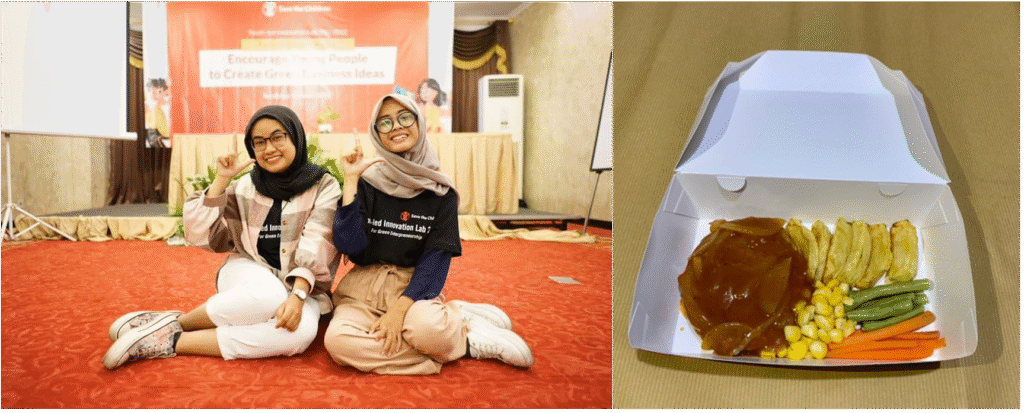
The Problem and Motivation Behind
“When my friends and I were in university, we struggled to find healthy food that was both affordable and tasty. That’s when we thought—why not create our own solution?” — Devi.
Devi, a 26-year-old from East Java, grew up in a community where meals were often meat-heavy and carbon-intensive, she and her teammate recognised how food choices directly contribute to the climate change. With extreme weather patterns and environmental disruptions becoming more frequent, Devi understood that shifting dietary habits could make a significant difference.
The problem is that food production, particularly meat-based diets, is one of the largest contributors to carbon emissions. Yet, awareness about how food choices impact the environment remains limited. For Devi, the challenge was also personal. During her university years, she and her friends struggled to find healthy, affordable food options that did not compromise on taste.
The Innovative Solution
“We wanted to make food that’s good for the planet and good for people. So, we created delicious plant-based alternatives like soy patties instead of beef, which has a much higher carbon footprint.” — Devi
The realisation of how dietary habits contribute to the climate change led Devi and her team to explore making low-carbon and nutritious meals in accessible and affordable prices for young people. They wanted to break the myth that sustainable food had to be bland or costly. “Many young people think healthy, and environment friendly food is expensive and tasteless. We wanted to change that by making sustainable eating both delicious and accessible.” — Devi explains.
Their idea took shape when she joined the Youth Innovation Lab, where she gained the confidence and practical skills to develop her concept into a viable business. Through hands-on training, and her team learned business management techniques, marketing strategies, and Devi the importance of climate action within the food industry. “Before joining the lab, I had no idea where to start. I lacked confidence. But after learning from the mentors, I believed in myself and in my vision for Low Carbon Catering.” — Devi adds.
Low Carbon Catering focuses on offering plant-based and locally sourced meals, which significantly reduce carbon footprints while promoting sustainable agriculture. They directly partner with local farmers to source fresh ingredients, including plant-based proteins like soy-based patties and small-scale, low-carbon chicken farming. This partnership ensures that the ingredients are not only sustainable but also support the local economy. Additionally, they use eco-friendly packaging to ensure that their sustainability practices extend beyond the food itself.
Since launching, Low Carbon Catering has completed many catering orders, with each purchase contributing to lower carbon emissions compared to traditional catering services. The aim of Low Carbon Catering is beyond selling healthy food, and more about inflecting consumption habits toward more sustainable alternatives, as emphasised by Devi – “We’re not just selling food—we’re changing mindsets about what it means to eat sustainably.”
Lessons Learned from Addressing Challenges
- Balancing studies and running a business: As a small team, managing both the business and personal responsibilities was challenging. To cope, they introduced a pre-order system, which helped manage production more efficiently and avoid overcommitment.
- Using social media to influence consumer perception: Devi noticed that many people were hesitant to switch to plant-based meals, primarily because they perceived them as less tasty or more expensive. To address this, the team used social media and word-of-mouth to educate people about the benefits of low-carbon eating.
- Collaborating with housewives to increase production capacity: With just two people handling the operation, they could only take a limited number of orders. The team plans to expand by collaborating with housewives and local youth, thus building a community-based workforce. “Running a food business is tough, but the support we received from our community and local farmers kept us going.” — Devi explains.
Next Steps and Future Aspirations
“We dream of a world where eating sustainably isn’t a choice—it’s the norm.” — Devi
Devi envisions expanding Low Carbon Catering to reach more communities and make sustainable eating more mainstream. Her future plans include:
- Expanding Production: Scaling up beyond East Java to serve a wider demographic.
- Hiring and Training More People: Engaging housewives and young people to increase production capacity and provide employment.
- Educational Campaigns: Increasing awareness about sustainable eating through workshops and social media.
- Introducing New Meal Options: Developing more plant-based dishes to diversify their offerings and attract a broader customer base.